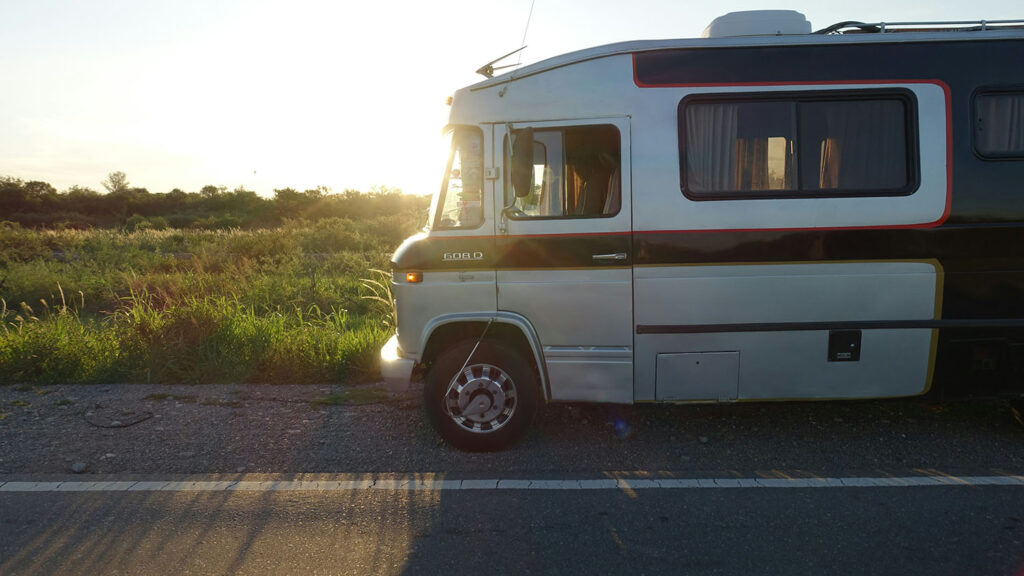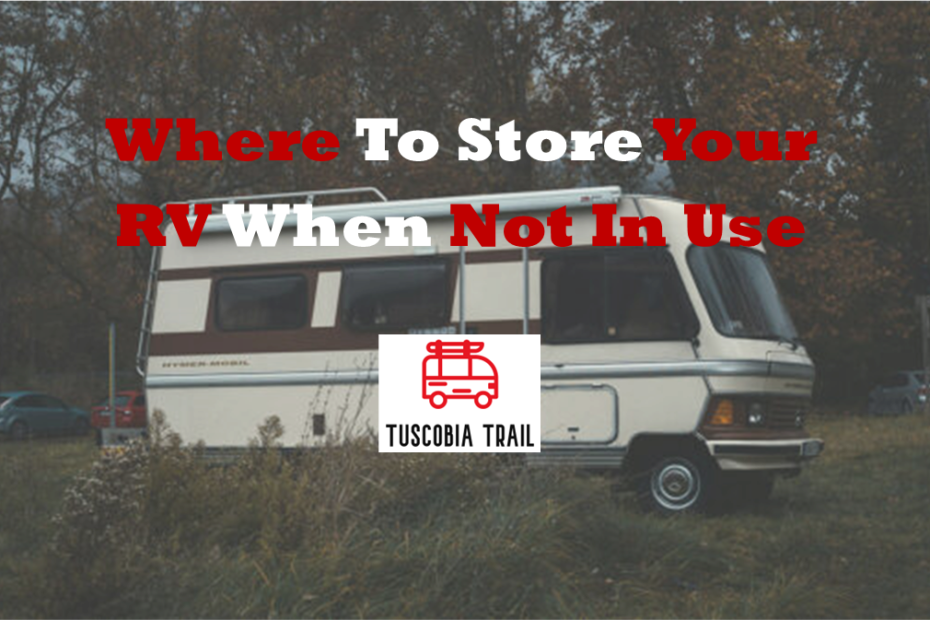Deciding on a storage location for your RV when it’s not roaming the highways can be as crucial as planning your next adventure. Where should I store my RV when not in use? Here’s our pointers and tips.
Indoor storage offers the highest protection, especially during winter weather, as it shields your RV from freezing temperatures and keeps it safe from the elements.
If you’re considering outdoor spaces, look for covered storage to reduce the risk of damage, and make sure the space is secure. It’s also wise to ensure your insurance covers the type of storage you choose.
Assessing Your RV Storage Needs
Before settling on a storage solution for your RV, it’s important to weigh the benefits of outdoor parking against the need for professional storage.
Outdoor parking can be more cost-effective but may lack certain security features and leave your RV open to weather damage.
Professional storage, while more expensive, provides added security and can offer both indoor and outdoor options, depending on your budget and needs.
With your RV meticulously prepped and stored, the excitement builds for the next journey that awaits. Before you hit the road, ensure that every system is operational and that your RV feels just like home.
A thorough guide to RV maintenance can steer you through the process, making sure that everything from the engine to the appliances is in top-notch condition.
This way, you can venture out, perhaps to a majestic national park, with the assurance that your home on wheels is as ready for adventure as you are.
Factors to Consider Before Choosing Storage Space
When selecting a storage space for your RV, consider the size and accessibility of the space, the security measures in place, and whether the facility offers amenities like battery charging or dump stations.
Outdoor parking solutions are convenient for those who need frequent access to their RV, but professional storage facilities may offer a greater range of services and protections for proper RV storage.
Seasonal Considerations for Your RV
Seasonal changes can greatly impact your RV’s condition, especially during harsh winter months.
Preparing for Winter Storage
Preparing for winter storage involves ensuring your RV is protected from freezing temperatures. Draining water lines, adding antifreeze to the plumbing system, and protecting the interior from moisture are essential steps.
It’s also prudent to check for any openings where pests might enter and seal them. A thorough cleaning and removal of perishables will help avoid unwanted surprises come spring.
Home Sweet Home Storage Solutions
Storing an RV at home might seem like the obvious solution, but not everyone has access to the right kind of space.
If you store your RV on your property, it could be exposed to the elements, leading to potential damage from UV rays and moisture.
On the other hand, professional RV storage facilities offer a variety of storage spaces, including uncovered storage options, though these may leave your RV vulnerable to weather-related wear and tear.
If you’re considering parking your RV at home, take steps to protect it from airborne debris, UV rays, and moisture buildup.
Choose a level, paved surface to prevent sinking or tilting, and use covers designed for RVs to shield your investment from the elements.
Advantages of Storing an RV at Home
Storing an RV at home can offer convenience and cost savings. It allows for easy access to your vehicle and the ability to perform regular maintenance checks.
If uncovered spaces are your only option, consider parking on a friend or family member’s property, shielded from direct sunlight, and remember to keep the fresh tank emptied to prevent issues.
Building a Custom Storage Structure
For those who have the space, building a custom storage structure for your RV can be a rewarding investment.
A dedicated space can be designed to fit your specific RV dimensions, offering protection from the elements and potentially increasing your property’s value.
Consider the long-term benefits of a secure, accessible, and protective environment for your RV as you don’t want to damage the value of your van.
Exploring Professional RV Storage Facilities
Professional RV storage facilities offer a range of options to suit the needs of long-term RV storage. Across the United States, these facilities, including storage units and RV parks, provide features and security for peace of mind while your RV is not in use.
Self-Storage Units Versus Full-Service Facilities
When comparing self-storage units and full-service facilities, consider the level of vehicle storage care you desire. Full-service facilities often provide proper RV storage with additional services, while self-storage units may offer more basic options at a lower cost.

Indoor Versus Outdoor Storage Units
Choosing to park your RV in a climate-controlled space offers protection from harsh weather and can preserve battery life. On the other hand, outdoor parking lots might be more affordable but lack the comprehensive protection for your RV.
The Perks of Covered RV Storage
Storing your RV outdoors with covered parking spaces can offer a middle ground between full protection for your RV and cost savings.
This option shields your RV from direct exposure to the elements while being more budget-friendly than indoor alternatives.
Innovative Storage Alternatives
If you are not in one of the states where RV living is permitted, RV owners are now looking beyond traditional storage solutions and considering innovative alternatives for long-term RV storage.
Peer-to-Peer RV Storage Networks
Peer-to-peer RV storage networks provide a unique platform for RV owners to find affordable and local storage options.
These networks connect people with available space to those needing long-term RV storage, often at competitive rates.
Renting Out Your RV as a Storage Solution
Renting out your RV can serve as a storage solution that also generates income. By allowing others to enjoy your RV while you’re not using it, you can offset some of the costs associated with RV ownership, including storage fees.
Prepping Your RV for Its Hibernation
Before tucking your RV away for a long rest, it’s crucial to address several key maintenance and preservation concerns. This preparation will not only extend the life of your RV but also ensure that it’s ready for your next journey without any unpleasant surprises.
Maintenance Must-Dos Before Storage
Effective RV storage begins with thorough maintenance. Drain all water tanks to prevent freezing temperatures from causing damage.
The engine and generator should have fresh oil, and batteries must be disconnected and stored properly. Moreover, wash the exterior to remove any debris that could cause deterioration over time.
Pest Prevention Strategies
Rodents and insects can turn your RV into their home if you’re not careful. To deter these uninvited guests, seal all openings, remove all food traces, and use natural repellents.
Strategic placement of traps and mothballs can also help ensure pests don’t make your RV their winter retreat.
The Importance of Sun Damage Protection
When storing your RV outdoors, safeguarding it from sun damage is imperative. UV rays can fade paint and crack seals, leading to costly repairs.
Use tire covers to protect the wheels and apply a UV protectant on the exterior surfaces. If possible, choose a shaded or covered storage location to minimize exposure.
Financial Aspects of RV Storage
Choosing a storage solution for your RV is not just about location and amenities; it’s also a financial decision. Understanding the various costs associated with different storage options will help you budget accordingly and select the best space for your needs and wallet.
Understanding the Costs of Different Storage Options
Different storage solutions come with varying price tags. Home storage may require an initial investment, while professional facilities offer different rates for indoor or outdoor spaces.
Comparing Traditional and Peer-to-Peer Storage Costs
Traditional RV storage facilities typically offer a range of services at a fixed cost, including security and sometimes climate control.
In contrast, peer-to-peer storage may present a more economical and flexible option, with prices varying depending on the individual host’s offerings and location. It’s essential to weigh the benefits and security features of each against their cost.
Security Measures for Peace of Mind
Ensuring the security of your RV during storage is paramount. Implementing robust security measures can protect your investment from theft, vandalism, and other potential risks.
A combination of physical barriers, surveillance, and strategic practices can help keep your RV safe.
Ensuring Your RV’s Safety While Stored
Optimal storage facilities will offer climate control, guarding your RV against extreme temperatures and humidity, which can attract unwanted damage to interiors and systems.
Tips for Keeping Your RV Secure in Different Storage Settings
Whether at home or in a professional lot, security starts with strong locks and a well-lit area. Consider motion-sensor lights and surveillance cameras for added deterrence.
In public facilities, look for gated access and on-site staff. Regularly check on your RV to ensure its safety and condition.
The Convenience of Local Storage Facilities
Proximity to your storage facility can make a significant difference in convenience and accessibility. Choosing a local option can save time and hassle, making it easier to perform routine checks and maintenance on your RV.
Finding Nearby RV Storage Solutions
Local directories and online searches can provide a list of nearby RV storage solutions. Consider the convenience of access when choosing the right facility for your needs.
Why Proximity Matters for RV Owners
Storing your RV close to home means quick access for spontaneous trips and easy monitoring. It allows for last-minute checks or grabbing forgotten items without the inconvenience of a long drive.
Local storage facilities also enable owners to respond promptly to any alerts or issues with their stored RV.
Proper RV Care Post-Storage
After a period of storage, your RV will need some attention before hitting the road again. Addressing any potential plumbing problems, ensuring the circuit breaker is functioning correctly, and conducting a thorough inspection will help transition your RV from storage to travel-ready seamlessly.

Transitioning From Storage to the Open Road
Reactivating your RV involves several key steps. Check tire pressure, recharge the battery, and inspect all systems.
If you winterize your RV, you’ll need to reverse the process, ensuring that water systems are functioning and antifreeze is flushed. A test drive is also advisable to confirm everything is in working order.
Checklist for Reactivating Your RV
When your RV is stored and the time comes to hit the road again, a thorough checklist ensures a safe and smooth transition back to RV life.
Start by examining every nook and cranny for pests and cleaning out any perishable items left behind. Check that the battery disconnect switch is turned back on, and inspect your RV for any maintenance issues that may have arisen during storage.
Lastly, add a fuel stabilizer to your fuel, if you haven’t already, to ensure the engine runs smoothly after its hibernation period.
Expert Advice and Resources
For those new to properly storing an RV or seeking to refine their approach, expert advice can be invaluable. Consulting professionals who specialize in RV maintenance and storage can offer tailored insights into preparing your RV for storage.
They provide tips and tricks that can save time, and money, and prevent potential issues, making the process of storing and reactivating your RV as seamless as possible.
Consultation Services for Tailored RV Storage Solutions
Finding the right storage solution for your RV can be daunting. Consultation services can help you navigate the myriad of RV storage options, from outdoor storage options to enclosed storage, and help you understand the implications of each choice, including security measures and monthly rate considerations.
They can assist in developing a plan to store your RV that fits your specific needs, emphasizing the importance of air circulation and protection against the elements.
Tapping Into Online Forums and Communities
Online forums and communities are treasure troves of knowledge where RV owners share alternative storage solutions and experiences. By tapping into these platforms, you can gather real-life advice on every aspect of RV life, including preparing your RV for storage.
Engaging with these communities allows you to learn from others’ successes and mistakes, providing a diverse perspective on everything from using steel wool and expanding foam for pest prevention to the best practices for ensuring proper air circulation.
Best RV Storage Solution Options
Seasonal travelers, in particular, must remember the importance of winterizing an RV before storage to avoid any unwelcome surprises when it’s time to travel again.
By taking the necessary precautions, such as draining water systems and protecting the engine, you safeguard your vehicle against the harsh elements of winter.
When spring rolls around, a de-winterized and well-maintained RV means you can embark on your next escapade with a sense of security and eagerness for the open road ahead.
